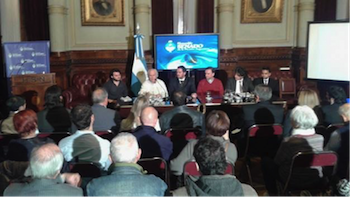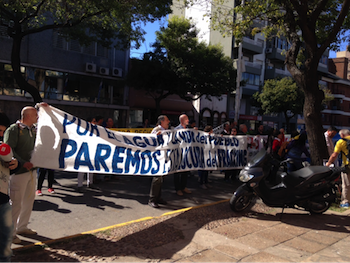There is a misconception in the United States, that for Latinos in our country, and people in Latin America, environmental issues are not a priority. Latinos care deeply about the environment, and what impact our actions have on our Mother Earth. This point was never as clear to me as on my recent trip to Argentina.
With mass expansion of oil extraction in their country through fracking, and the government providing incentives through secret deals for multinational corporations, Argentinians are coming together to protect their environmental rights. Small, but passionate, community groups have organized to stand up and speak with one voice. The public are educating themselves, and are learning that fracking is not the rosy, revolutionary, safe process sold to them by their government.
The ‘facts' as painted by the industry, and sold to the American public over the past decade, were that fracking will bring about an energy revolution, create jobs, fill government coffers and private landowners accounts with royalties, achieve energy independence, serve to “transition” us towards a more green economy, and protect our environment.
The truth is, fracking and drilling have polluted surface and groundwater sources on many states, reduced air quality, created a host of public health issues, reduced property values, caused earthquakes from the disposal underground of wastes, and created boom cycles that are bursting in many states due to the collapse in oil prices. After all this, fracking still has not brought about the energy independence the US was promised, with consumption far exceeding production.
Suffice it to say, the costs of fracking over the long-term have far outweighed any short-term benefits it has brought.

Senator Pino Solanas leads a panel discussion on energy
This kind of information, including scientific and academic studies, is not easily available in Argentina. Fracking has been sold as a saving grace by the government, which has recruited big names to sell the process, including the Argentinian national soccer team. Overall, the general public sees fracking positively, and those who oppose it are seen as “opposing progress.” Argentinians want accurate information, and have asked us, their American counterparts, to tell the real story of fracking.
In Argentina, the public cares deeply about protecting their environment. They describe themselves are “pro clean water, pro clean air, and pro environment.” Fracking is currently occurring in the Vaca Muerta region, and threatening to expand into areas, including the northeast province of Entre Rios, where several municipalities have declared themselves Free from Fracking. This region overlies the Guarani aquifer, one of the largest freshwater sources in the planet, underlying the countries of Argentina, Paraguay, Brazil, and Uruguay. Were fracking to occur in this region, the danger of polluting this vital water source for millions of people would be unprecedented.
On May 5, 2015, delegations from Earthworks, Ecologic Institute, and the FracTracker Alliance, traveled to Argentina to share our stories. Working with our partners in Argentina, we were able to attend a series of events aimed at showing the real costs of fracking to US communities. As soon as we arrived, we were fortunate to attend a hearing of the Argentina Senate Environment Committee, where we spoke with Senators and staff members.
On May 6, we participated in a panel discussion with members of the religious community, elected officials, and Senator Fernando Pino-Solanas, at the Argentine Congress. Over 150 people attended the event, including Senators and Legislators. Thanks to information provided by the Ecologic Institute, we were able to provide alternatives specific to Argentina, including renewable energy potentials for solar and wind. The presentation brought about an open discussion in which the public expressed their desire to protect their water sources, and respect the rights of citizens and nature.
Although the general sentiment towards the US is one of imperialism and negative feelings, we were welcomed, as we were sharing stories not tainted by industry propaganda, and showing how communities in the US are really being affected by fracking. We were not there to tell them what to do, but rather show them the real costs of fracking, and let the citizens of Argentina decide if this process is worth the costs to their country.

Public protest against the use of terrorism laws to prosecute environmental activists.
The next day, as we traveled through the countryside on our way north, we passed the wetlands created by the River Uruguay as it flows its way south, where it meets the Parana River, and forms the famous Rio de la Plata. This area hosts a variety of wildlife, making it hard to imagine what would happen if fracking were to begin here.
That night, in Paysandú, Uruguay, we spoke to a packed room in an area that was one of the first to declare itself free from fracking in the country. Passionate people listened intently as we shared our story, and showed them pictures of communities affected by fracking in the US. They don’t want the same to happen to their country, and continue supporting Uruguay’s strong investments in clean, renewable energy. We had the chance to speak to a group of teens, which organized their community and rallied against fracking, just as seismic testing was being planned around their homes. Their work was admirable, and it was honor to have met them.
On May 8, 2015, we were the opening speakers at the 4th Annual National / 2nd Annual International Anti-Fracking Conference. Activists from all over the country attended, including students from the local university who are interested in environmental issues. We were followed by activists from Uruguay, Brazil, Bolivia, Colombia, and Mexico, all who are just as passionate about protecting their health and their environment. Their testimony showed us that this is truly a global problem, one that will affect us all if we don’t band together. A growing global alliance of citizens from many countries will allow us to speak with a greater voice, standing up to corporations who operate across national borders, and control multiple levels of government.
After our talk, we were invited to participate in a march from the event venue, to the local branch of the National Appellate Court. Recently environmental activists in Argentina have been tried and convicted under terrorism laws. The march was meant to show solidarity with those convicted, and protest the need to use extreme measures against people trying to protect the environment. This falls in line with tactics in other countries to intimidate anti-fracking activists. They are not alone, and we stand with them. We were joined by an unlikely crew who helped protect us from motorists and unfriendly members of the public – a gang of street dogs. It is said that dogs can sense when humans care deeply about something. They could feel the passion in the crowd. This issue really transcends species.
The event organizers put together a variety of events, including a radio interview with local talk radio – FM Litoral. The interviewer asked tough questions, including what fracking has cost to communities in the US, and what the future of the process in Argentina was. Along with our partner, Juan Pablo Olsson, we spoke for nearly 20 minutes to audiences, helping spread knowledge and educate the public.
We concluded the night sharing a bottle of homegrown Malbec with our in-country partners, and sharing a parrillada – an Argentinian delicacy consisting of various meats, before heading back to Buenos Aires for our trip to the Mendoza Province.
